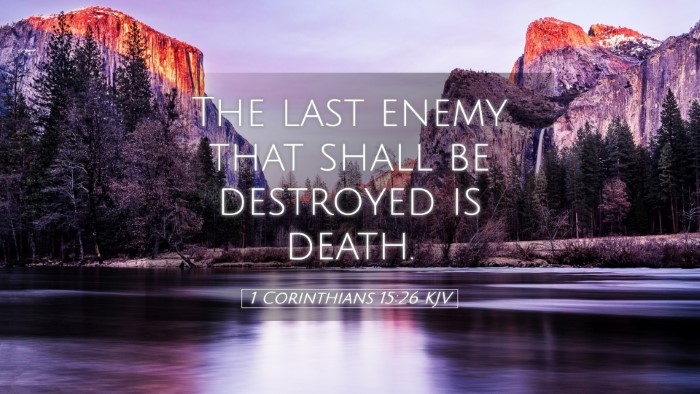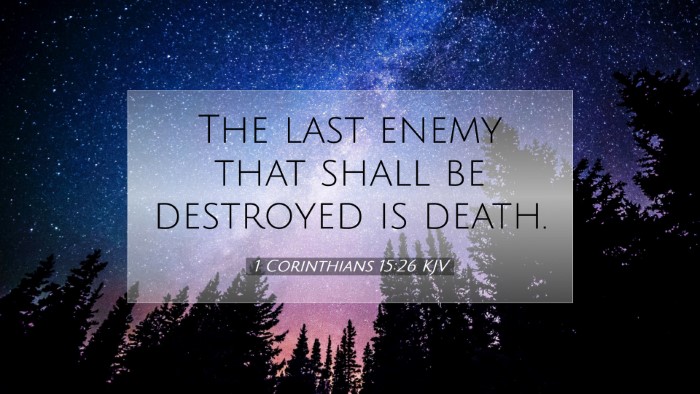Commentary on 1 Corinthians 15:26
1 Corinthians 15:26: "The last enemy that shall be destroyed is death."
Introduction
This verse from 1 Corinthians 15 encapsulates a profound theological truth concerning the ultimate victory of Christ over death. It is a statement that points towards the eschatological hope that lies at the heart of Christian belief: that death, as the final and most fearsome adversary, will be vanquished. In examining this verse, insights from various public domain commentaries will shed light on the context, meaning, and implications for believers today.
Contextual Background
Paul's first letter to the Corinthians addresses a community grappling with issues of resurrection, morality, and spiritual gifts. Chapter 15 serves as a critical exposition on the resurrection of the dead, affirming not only the resurrection of Jesus but also the future resurrection of believers. In this context, the mention of death as the last enemy brings into focus the reality of death as a formidable foe that reigns throughout the ages.
Insights from Commentaries
-
Matthew Henry:
Henry emphasizes the significance of this verse within the larger framework of resurrection theology. He notes that death is frequently depicted in Scripture as the consequence of sin, thus serving as both a physical and spiritual adversary. Henry points out that the words "last enemy" denote that death holds the final place in the onslaught of evil forces against humanity. Yet, he assures readers that this enemy will be completely abolished at the consummation of Christ's kingdom.
-
Albert Barnes:
Barnes elaborates on the nature of death as a "last enemy." He connects this idea with the overarching themes of spiritual warfare, illustrating that amid life's trials, believers are assured that death will ultimately be defeated. He notes that the resurrection of Christ serves as a foretaste of the final victory over death for all believers, making this verse a source of hope. Barnes stresses the importance of clarity in understanding the resurrection as a foundational doctrine of the Christian faith.
-
Adam Clarke:
Clarke offers a detailed examination of the word "destroyed," pointing to its connotations of complete obliteration. He highlights that Paul uses profound theological language to assure his readers of the finality with which death will be abolished. Clarke also reflects on the implications for the believer's resurrection: that as death holds no ultimate power, Christians are called to live in the light of this promised victory. He underscores the importance of living victoriously over sin, which contributes to the power of death.
Theological Implications
This verse offers several theological implications that are vital for understanding Christian eschatology:
-
The Nature of Death:
Theologians view death as not merely a physical end but as a spiritual separation from God, and as such, is often seen as the ultimate consequence of sin. This understanding elevates the concept of death from a mere biological event to a profound theological predicament.
-
Resurrection Promise:
The promise of resurrection, which Paul passionately defends throughout this chapter, serves as the cornerstone of hope for believers. The defeat of death enables the faithful to anticipate a future devoid of sorrow and suffering—an eternity in communion with God.
-
Encouragement in Suffering:
For pastors and theologians, this verse serves as a powerful message of comfort to congregations grappling with grief and loss. It asserts the assurance that though death reigns temporarily, its power is diminished in light of the resurrection hope offered through Christ.
-
Call to Holiness:
Understanding the defeat of death also carries a practical call to live a life dedicated to Christ. The assurance of victory over death compels believers to live in accordance with God's will, embracing a lifestyle that reflects the hope of the resurrection.
Conclusion
1 Corinthians 15:26 encapsulates the victory of the resurrection over death, positioning it as the last enemy to be defeated. Insights from Matthew Henry, Albert Barnes, and Adam Clarke enhance our understanding of this verse within the larger context of Paul’s teaching on eschatology. For pastors, students, and theologians, this verse not only provides hope and assurance but also challenges believers to live in light of the promise of resurrection, recognizing that death is indeed a conquered foe. As we await the ultimate fulfillment of this promise, we hold fast to the truth that Christ’s resurrection guarantees our own, securing our victory over sin and death.


